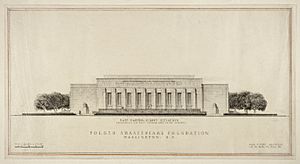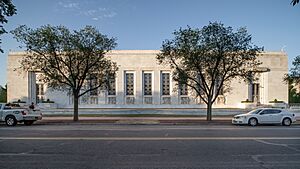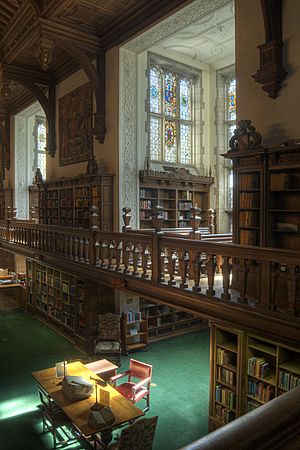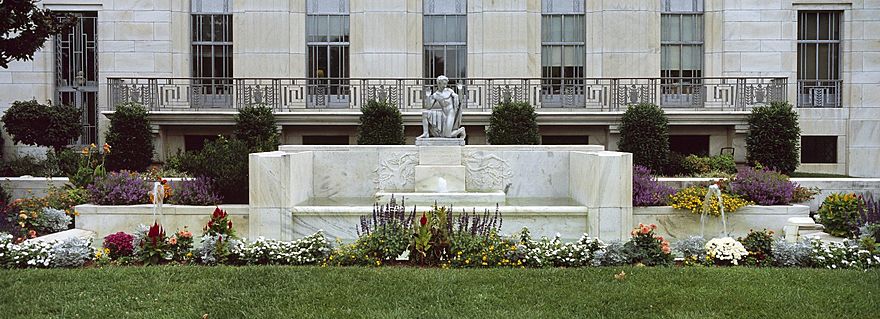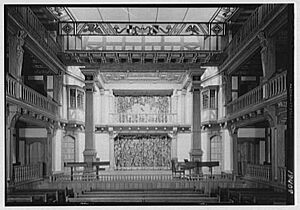Folger Shakespeare Library facts for kids
Quick facts for kids Folger Shakespeare Library |
|
|---|---|
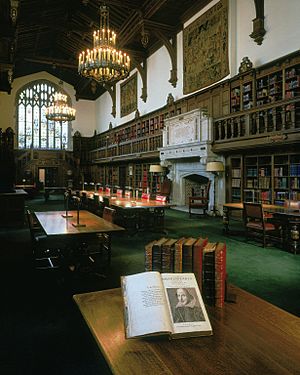 |
|
| The Folger Shakespeare Library reading room with one of Shakespeare's First Folios in the foreground | |
| Country | United States |
| Type | Private Research library Special library |
| Scope | Early modern Europe, Shakespeare |
| Established | 1932 |
| Location | Washington, D.C. |
| Coordinates | 38°53′22″N 77°0′11″W / 38.88944°N 77.00306°W |
| Collection | |
| Items collected | Shakespeare-related materials, rare books, manuscripts, prints, drawings, playbills, paintings |
| Other information | |
| Director | [Dr. Farah Karim-Cooper] |
The Folger Shakespeare Library is a special library in Washington, D.C., United States. It holds the world's largest collection of printed works by William Shakespeare. It also has many rare items from the early modern period (1500–1750) in Britain and Europe.
The library was started by Henry Clay Folger and his wife, Emily Jordan Folger. It opened in 1932, two years after Henry's death. The Folger offers programs for scholars and teachers. It also has a theater, music concerts, poetry readings, and family events. The library helps preserve old and rare materials.
The Folger is a private library. It is managed by Amherst College. The library building is a historic landmark.
Contents
History of the Folger Library
Henry Clay Folger loved collecting things about Shakespeare. He started in 1889 by buying a rare book called a Fourth Folio. He and his wife, Emily Jordan Folger, wanted to build a library for their collection.
They chose a spot next to the Library of Congress in Washington, D.C. Henry bought the land over several years. In 1928, the U.S. Congress agreed to let him use the land for his library.
The library's first stone was laid in May 1930. Henry Folger died soon after. He left most of his money in a trust for the library. Amherst College became its manager. Emily Folger helped finish the project. The library opened on April 23, 1932. This date is believed to be Shakespeare's birthday. Emily Folger stayed involved until she died in 1936.
During World War II, about 30,000 items from the Folger were moved for safety. They were stored at Amherst College. This was done in case Washington, D.C., was attacked.
Many of the Folger's public events started in the 1970s. Director O.B. Hardison helped make the theater safe for performances. He also started the Folger Poetry Series and the Folger Institute. The Folger Consort, an early music group, began performing in 1977.
Buildings and Gardens
The main Folger building was designed by architect Paul Philippe Cret. It is made of white marble. The outside has nine stone carvings called bas-reliefs. These show scenes from Shakespeare's plays. There is also an aluminum statue of Puck. Many quotes chosen by Henry Folger are carved into the building.
Inside, the building looks like an old English Tudor style home. It has oak walls and fancy ceilings. The Elizabethan Theatre lobby has the original Puck statue. It also has paintings by Austin M. Purves Jr. Two special reading rooms are for scholars. Public areas include a large exhibit gallery, a gift shop, and an Elizabethan theatre.
Building Design
Henry Folger wanted an architect who could design a building in an old English style. He chose Paul Philippe Cret. Cret designed a building that looked classic but was simple. The Folgers agreed to this style. To make it feel Elizabethan, they added carvings of Shakespeare scenes.
These nine carvings on the front show famous moments from plays like A Midsummer Night's Dream, Romeo and Juliet, Macbeth, and Hamlet.
In 1959, a new part was added to the library. It included a roof garden. In 2000, a second building, the Haskell Center, opened. It houses the library's education and public programs. The Folger also has townhouses nearby. These provide housing for visiting scholars.
Reading Rooms
The main Reading Room opened in January 1933. It holds reference books for scholars. The library was updated from 1977 to 1983. This added new book shelves and office spaces. A second, more modern reading room was finished in 1982. In 2011, the original reading room was named the Gail Kern Paster Reading Room. This was to honor a former director.
Henry Folger wanted the reading room to feel like a cozy home and a grand college hall. It has stained-glass windows and a large fireplace. The big stained-glass window shows the "Seven Ages of Man" speech from As You Like It.
Elizabethan Theatre
The Elizabethan Theatre was not first built for plays. It was designed to show visitors what an Elizabethan theater looked like. Before plays started, it was used for concerts and talks. The theater seats about 260 people. On the ceiling, a famous quote from As You Like It is painted: "All the world's a stage, and all the men and women merely players."
The first play performed there was Julius Caesar in 1949. The Folger Theatre Group started in 1970. This was after the theater met fire safety rules.
Elizabethan Garden
An Elizabethan Garden is at the east end of the building. It opened in 1989. This garden has plants mentioned in Shakespeare's plays. In 2003, sculptures by Greg Wyatt were added. These sculptures are also based on Shakespeare's plays.
West Garden
Sculptor Brenda Putnam created a statue of Puck for the west garden. Over time, the statue became weak. In 2000, the original Puck was moved inside. It is now above the Elizabethan Theatre entrance. An aluminum copy replaced it in the garden.
Recent Renovations
The Folger Library and Theatre had big renovations. The building was closed to visitors from January 2020. It reopened on June 21, 2024. The updates added a new learning lab and new exhibits. There are also outdoor gardens with a new Juliet balcony. The great hall was redesigned and now has a cafe.
The Library Collection
The Folger has the world's largest collection of Shakespeare-related items. These range from the 16th century to today. The library is famous for its 82 copies of the 1623 First Folio. Only 235 copies of this book are known to exist. It also has over 200 early copies of Shakespeare's individual plays.
The Folger also owns the third largest collection of English books printed before 1641. It has many items about theater history. These include 250,000 playbills and 2,000 promptbooks. There are also costumes, recordings, and props. The collection includes over 90,000 artworks.
The Folger started cataloging its collection in 1935. In 1996, staff and readers could use Hamnet, the online catalog. It became public in 2000. Hamnet was replaced in June 2022.
Printed Books
The library has over 250,000 books. These date from the mid-15th century, when the printing press was invented, to today. Besides its 82 First Folios, it has 229 early copies of Shakespeare's plays and poems. It also has 119 copies of the Second, Third, and Fourth Folios. The Folger holds about 7,000 later editions of Shakespeare's works. These are in more than 70 languages.
The library's collection includes over 18,000 early English books printed before 1640. Another 29,000 were printed between 1641 and 1700. The library has 35,000 early modern books from Europe. About 450 of these are incunabula, which are books printed before 1501. These books cover many topics. They include literature, politics, religion, and medicine.
Manuscripts
The Folger has about 60,000 manuscripts. These are handwritten documents. They date from the 15th to the 21st century. They cover many subjects. These include theater history, personal letters, and wills.
Important manuscripts include the earliest known stage diagram in England. There are also notes George Eliot made for her book Middlemarch. The papers of famous 18th-century actor David Garrick are also here.
The Folger also hosts Early Modern Manuscripts Online (EMMO). This project puts images of 16th and 17th-century English manuscripts online for free.
Collection Highlights
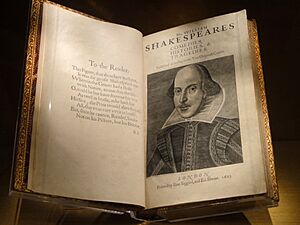
Some special items in the Folger's collection are:
- The only complete copy of Shakespeare's Titus Andronicus first quarto from 1594.
- The False Folio.
- The Macro Manuscript, which has the earliest known stage diagram in England.
- The Dering Manuscript, the earliest known manuscript for any of Shakespeare's plays.
- The Ashbourne portrait, a painting used in some theories about who wrote Shakespeare's plays.
- Henry VIII's childhood copy of Cicero's De officiis. It has his own writing in it.
- The Trevelyon Miscellany of 1608. This is a large book with 594 illustrated pages.
- The earliest Sieve Portrait of Queen Elizabeth I.
- Thirteen letters from John Donne about his secret marriage.
- Thousands of letters to and from the actor David Garrick.
Research and Education
The Folger offers programs for scholars and students. The Folger Institute helps advanced researchers. The Education department works with K–12 teachers and students.
Folger Institute
The Folger Institute has been a center for research since 1970. It offers fellowships for researchers. It also hosts a program for college students every January. The Institute holds workshops and conferences for teachers and students. It also works with over 40 universities.
Education Programs
The Folger's education programs started in the early 1970s. Today, they help K–12 students and teachers learn about Shakespeare. They focus on active learning. Teachers come to the Folger for programs to learn how to use Shakespeare in their classrooms. The department also publishes materials for schools.
Student programs include workshops and a high school fellowship. The Emily Jordan Folger Children's Shakespeare Festival started in 1980. It lets elementary students perform Shakespeare every spring. The Secondary School Shakespeare Festival began a year later. It brings students from grades 7–12 to perform scenes in the Folger theater.
Teaching Shakespeare Institute
The Teaching Shakespeare Institute (TSI) is a four-week summer program. It is for middle and high school teachers. The National Endowment for the Humanities helps fund it. Teachers work with experts to study Shakespeare's plays. They learn about scholarship, performance, and teaching. The program started in 1984 with 50 teachers. Now, 25 teachers attend each year. By 2015, over 775 teachers had completed the program.
Performances and Events
The Folger Shakespeare Library has many cultural and arts programs. These include the Folger Theatre, Folger Consort, and poetry readings.
Folger Theatre
Folger Theatre puts on plays inspired by Shakespeare. This includes Shakespeare's own works and new plays. Since 1992, the Folger Theatre has performed over half of Shakespeare's plays. Their shows have won many awards. Karen Ann Daniels became the artistic director in 2021. Performances happen in the theater at the east end of the building.
Folger Consort
Folger Consort is the library's music group. It was started in 1977. They perform medieval music, Renaissance music, and baroque music. The Consort performs at the Elizabethan Theatre and other places. They also hold talks and radio shows. The Consort has won awards for Best Classical Chamber Ensemble.
O.B. Hardison Poetry Series
Since 1970, the Folger has hosted famous poets. They read their poems and talk about them. This is now called the O.B. Hardison Poetry Series. Many well-known poets have been part of this series.
PEN/Faulkner Reading Series
The Folger also hosts the PEN/Faulkner Reading Series. This brings modern authors to the Folger. They read from their fiction books. The Folger also hosts the annual PEN/Faulkner Award for Fiction readings. These celebrate the year's best fiction writers.
Digital Resources
The Folger offers online tools for research. These include:
- The Digital Image Collection (LUNA). It has over 80,000 images from the collection. These include manuscripts, books, and art. The images can be used freely.
- Folgerpedia. This is the Folger's own wiki. It has information about the library and its collection.
- "All Shakespeare's works." These are online versions of Shakespeare's plays and poems.
- Early Modern Manuscripts Online. This site has images of manuscripts. It also helps people learn to read old handwriting.
Leadership
The Folger Library has had several directors. Michael Witmore became the seventh director on July 1, 2011. Dr. Farah Karim-Cooper became the director in 2024.
- William A. Slade (1931–1934)
- Joseph Quincy Adams (1934–1946)
- James McManaway (1946–1948, acting)
- Louis Booker Wright (1948–1968)
- Philip A. Knachel (1968–1969, acting)
- O.B. Hardison Jr. (1969–1983)
- Philip A. Knachel (1983–1984, acting)
- Werner Gundersheimer (1984–2002)
- Gail Kern Paster (2002–2011)
- Michael Witmore (2011–2024)
- Dr. Farah Karim Cooper (2024- )
Images for kids
 | Calvin Brent |
 | Walter T. Bailey |
 | Martha Cassell Thompson |
 | Alberta Jeannette Cassell |


